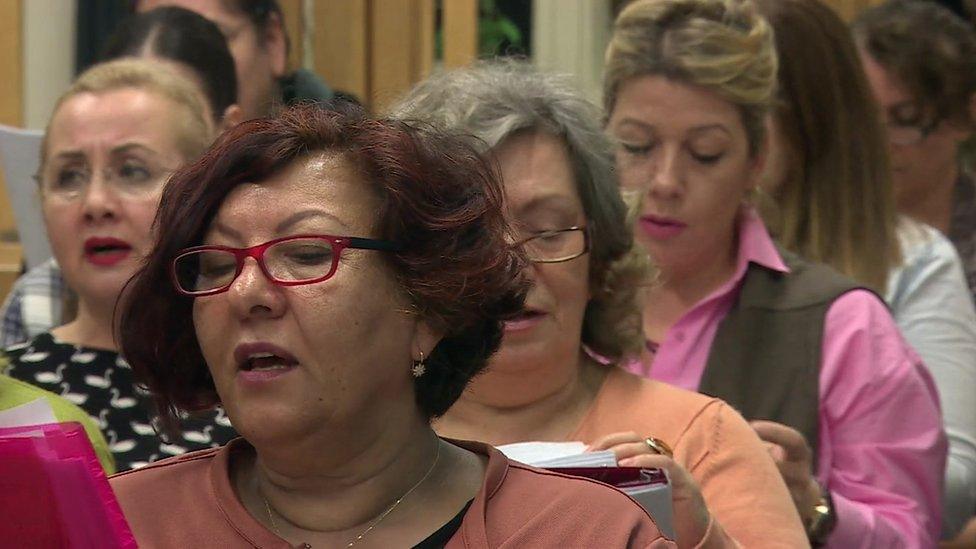Turkey-Netherlands row: How the press reacted
- Published
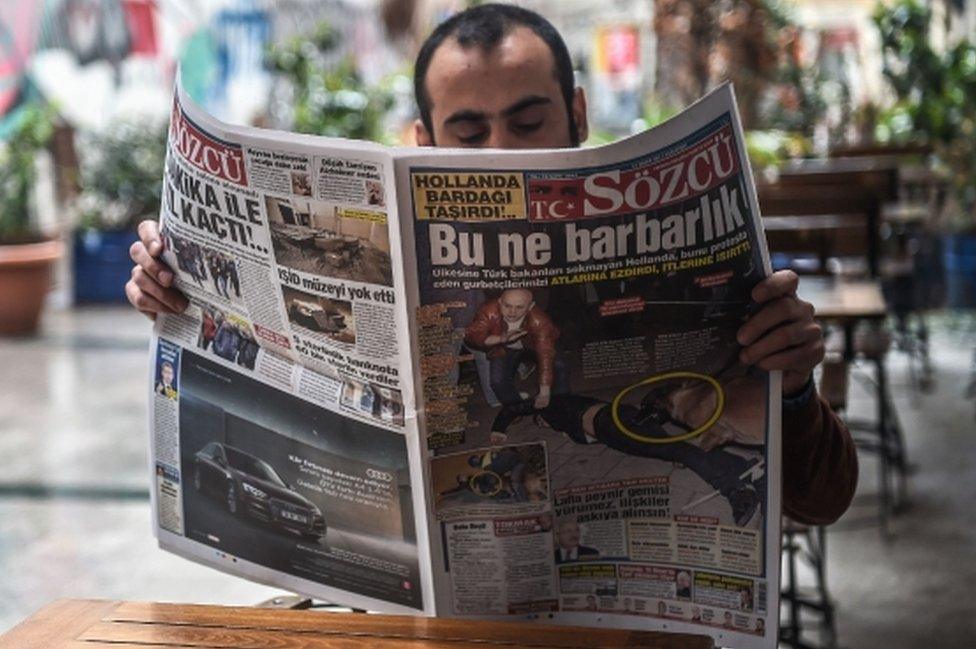
A Turkish newspaper reader absorbs the row between Turkey and The Netherlands
Turkish newspapers are fuming at a diplomatic snub after the Netherlands, Germany, and Austria blocked the Turkish government's attempts to hold rallies in those countries.
The government wants to appeal to expat Turks because they can vote in a key upcoming poll.
The referendum is on transferring sweeping powers to President Recep Tayyip Erdogan.
Mr Erdogan accused the Netherlands and Germany of "Nazism" in a furious outburst - and the Turkish press has echoed his anger.
But elsewhere in Europe, the focus is on how the tension will impact on Turkey's fraught relationship with Europe.
Turkish media: 'Racist dogs'
The pro-government newspapers Star, Yeni Safak and Aksam, the centre-right Haber Turk, and the centrist publication Milliyet all quoted President Recep Tayyip Erdogan warning that the Netherlands "will pay the price" for banning the rallies.
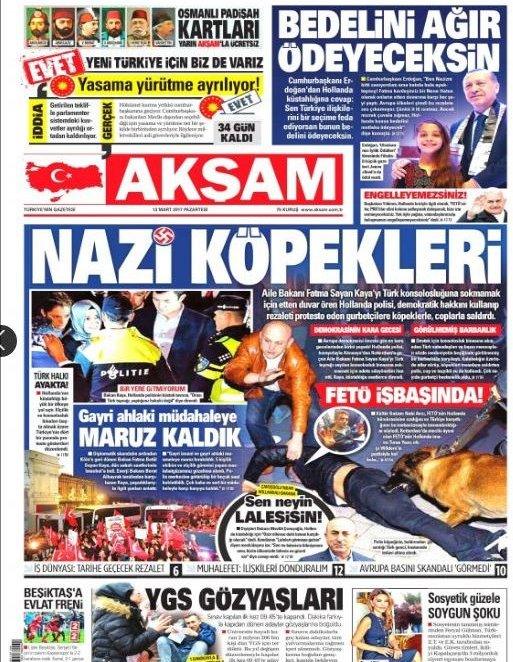
Aksam's front page featured the headline "Nazi Dogs"
The papers particularly lashed out at the Dutch authorities for using police to block Minister Fatma Betul Sayan Kaya's access to the Turkish consulate in Rotterdam, and then using force against Turkish protesters.
Star carried a picture of a Dutch police dog attacking a protester under the headline "Wilders' dogs" - referring to Dutch anti-Islam politician Geert Wilders.
Yeni Safak published the same picture with the headline "Racist dogs", while Aksam carried "Nazi dogs". Centre-right Hurriyet published the headline "Brutality".
The opposition tabloid Sozcu also criticised the Dutch, publishing a huge picture of the dog attack and the question "What kind of barbarism is that?"
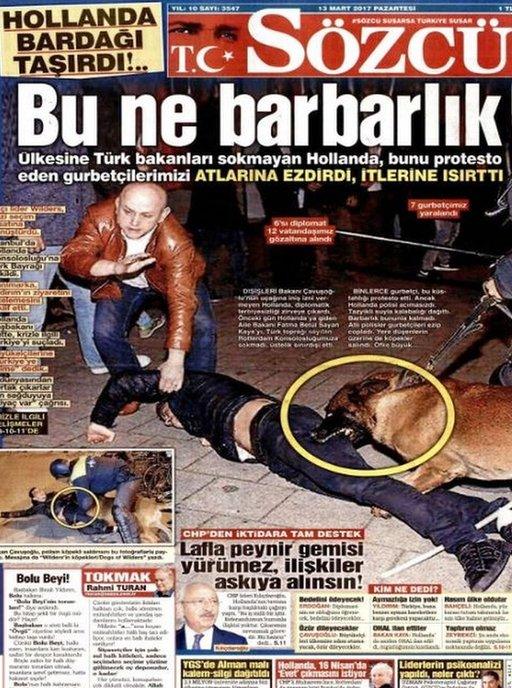
Sozcu branded the use of police dogs "barbaric"
Pro-government Sabah blasted the Netherlands, external, saying the country had "suspended freedoms" and "attacked with dogs".
Pro-government Karar's biggest headline noted that "Holland has united Turkey", adding that the government and the opposition have become "one voice" against Holland's "scandalous conduct" and "police vandalism".
Dutch press: 'We're in charge!'
Dutch reports suggest the Netherlands has also been united by the controversy.
Algemeen Dagblad's report says Prime Minister Mark Rutte had refused for years to be provoked by the government in Ankara. But as the election approached, it was the final straw. And his stance has united Dutch politics: "Such a degree of unity we have not seen during this election campaign," it says.
The Telegraaf features a picture of a Dutch policeman with a dog tackling a demonstrator under the headline "We're in charge here!"
NRC has an interview with the prime minister, external, who complains the crisis has affected his ability to campaign in Wednesday's elections.
The paper calls it the biggest diplomatic row of his premiership. Asked if he will apologise to Turkey, he says it was President Erdogan who likened the Netherlands to Nazi Germany, and so "he should apologise to us."
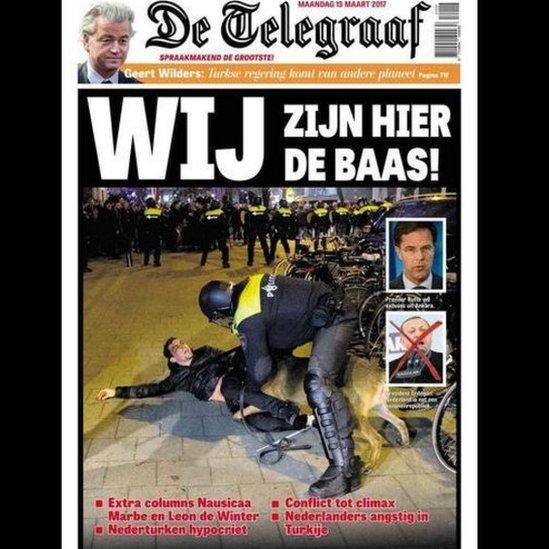
"We're the boss here!" is the headline in Dutch popular daily De Telegraaf
German headlines: 'Erdogan has misunderstood'
German broadsheet Die Welt ran with the headline, external: "Erdogan has misunderstood something in international law".
"Erdogan's government believes that it can apply its own authoritarian rules in foreign relations. But are consulates really the territory of a foreign state? The rules of diplomatic relations are clear," it states.
Tagesspiegel, a popular broadsheet daily, wrote of, external "a deep crack through the Netherlands".
"The relationship between the EU and Turkey is plunging into its deepest crisis," it wrote, external. "It seems that over the weekend new Turkish heroes were born, and Recep Tayyip Erdogan's supporters can push forward."

Der Tagesspiegel warned of a crisis between Turkey and the EU
Austria's press: Comparatively muted
Austrian broadsheet Wiener Zeitung ran the line, external that the Dutch prime minister "will not apologise to Erdogan" and "considers Erdogan's choice of words unacceptable".
"Dutch Prime Minister Mark Rutte has ruled out an apology for the expulsion of the Turkish family affairs minister and the entry ban on the Turkish foreign minister," it says.
Die Presse considered the fate of the ministers, external expelled from the Netherlands, writing: "The talk in government circles is that the treatment of the Turkish minister in the Netherlands was regarded as a breach of the Vienna Convention on Diplomatic Relations".
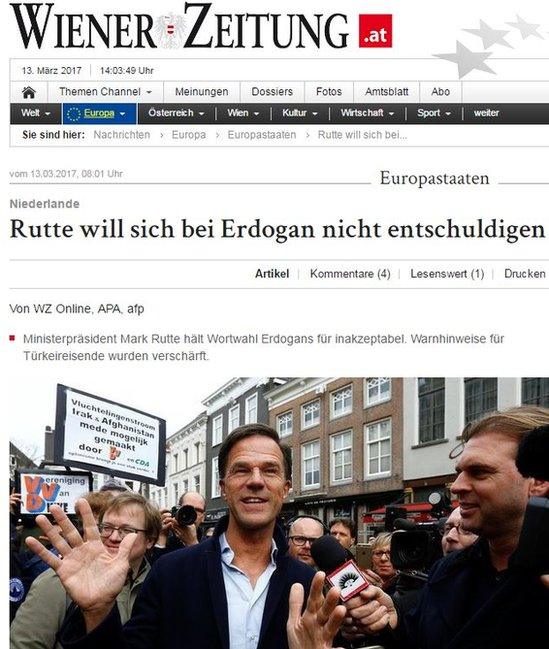
Austria's Wiener Zeitung said the Dutch PM will not apologise for the row
The Daily paper Kurier suggested , externalPresident Erdogan's overseas campaigning is partly aimed at Turkish students.
"Three quarters of the 2.9 million eligible foreign students live in five European countries: Germany, France, the Netherlands, Belgium and Austria," it said.
French papers: 'A bitter war of words'
France's oldest national daily, Le Figaro called the row, external an "unprecedented escalation between Ankara and The Hague" as President Erdogan "has embarked on a particularly bitter war of words against the Netherlands".
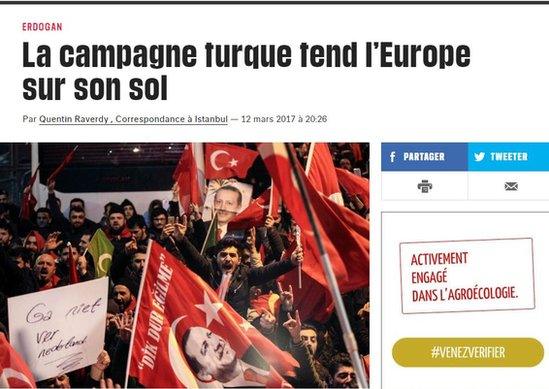
France's Liberation pondered a tense future for Turkey and Europe
Le Monde sees the EU "divided" amid tension between Turkey and the Netherlands. "In France, the case has taken a political turn", it notes, external, adding that conservative presidential candidate Francois Fillon criticised the "break-up of European solidarity".
Liberation says the row could darken the horizon for EU-Turkey relations.
"This would have an impact on the Turkish political scene: by building on this anti-European rhetoric and by placing Turkey in the position of a 'victim', Erdogan could be seeking to consolidate the votes of the nationalist electorate," the paper says, external.
Compiled by BBC Monitoring
A look at how tensions between Turkey and the Netherlands unfolded
- Published13 March 2017
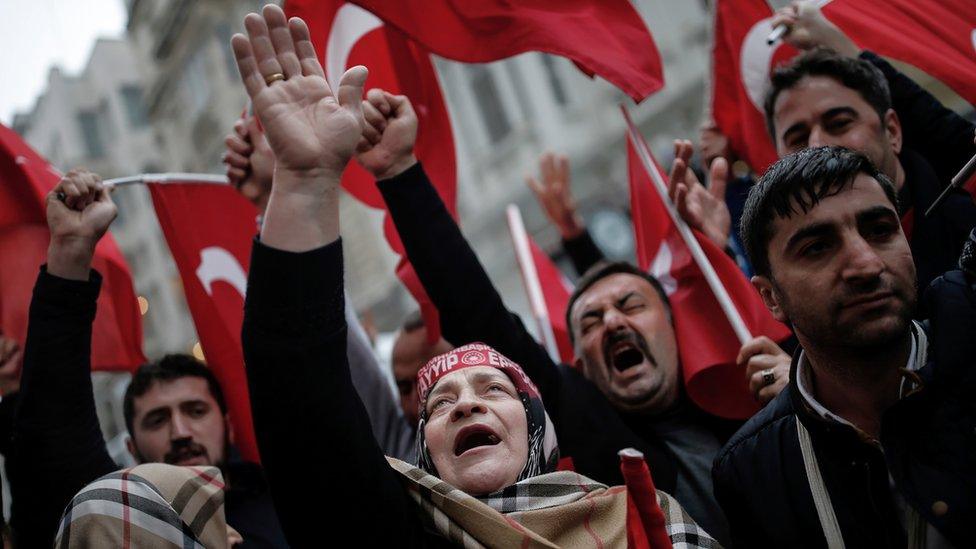
- Published13 March 2017
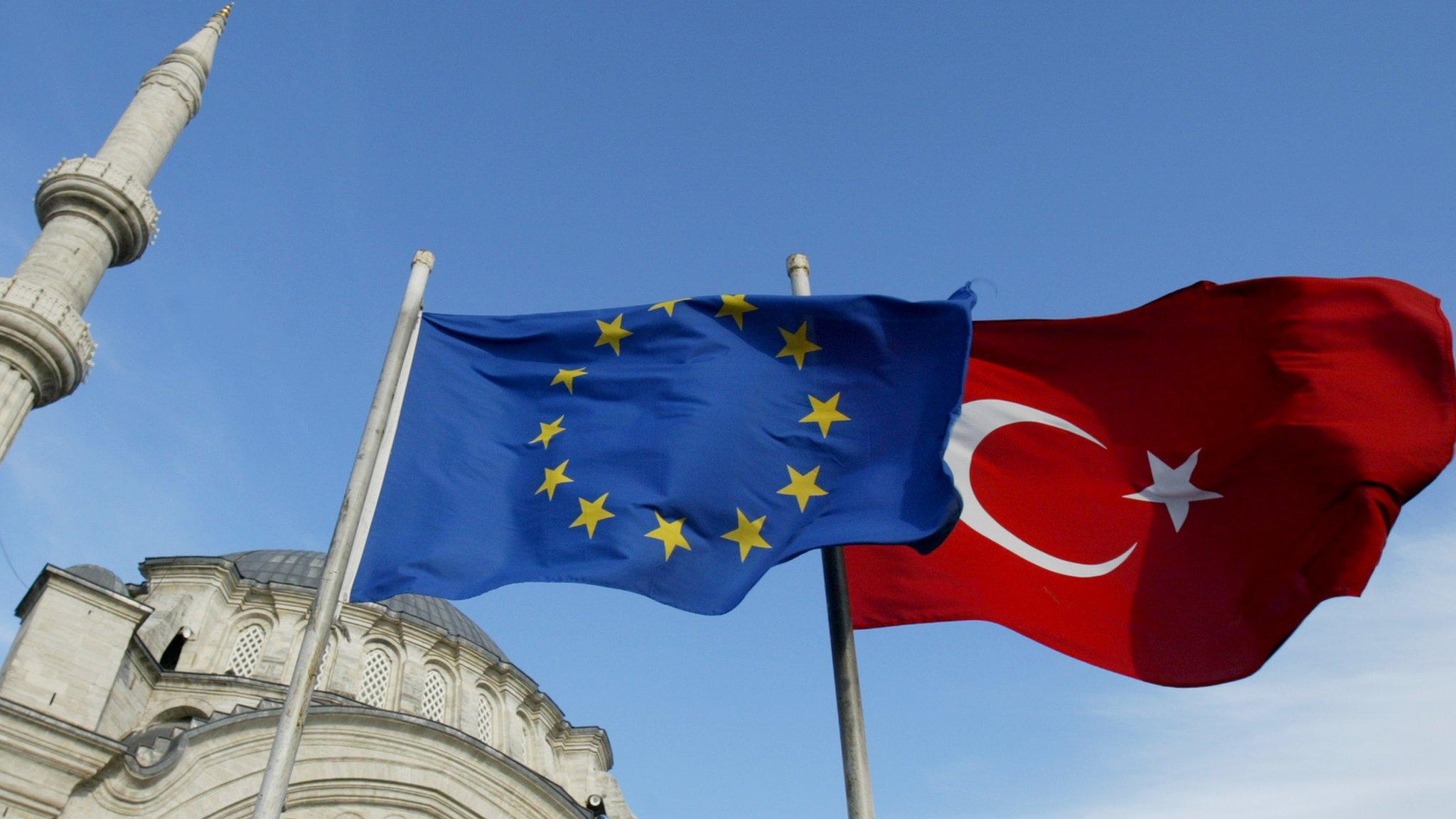
- Published27 February 2017
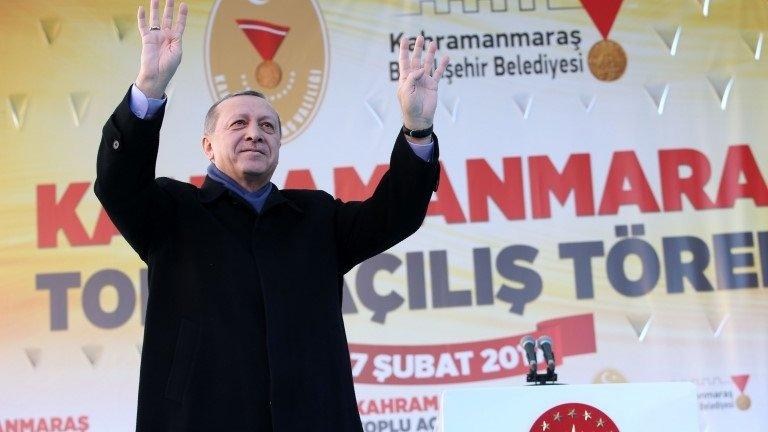
- Published9 March 2017
